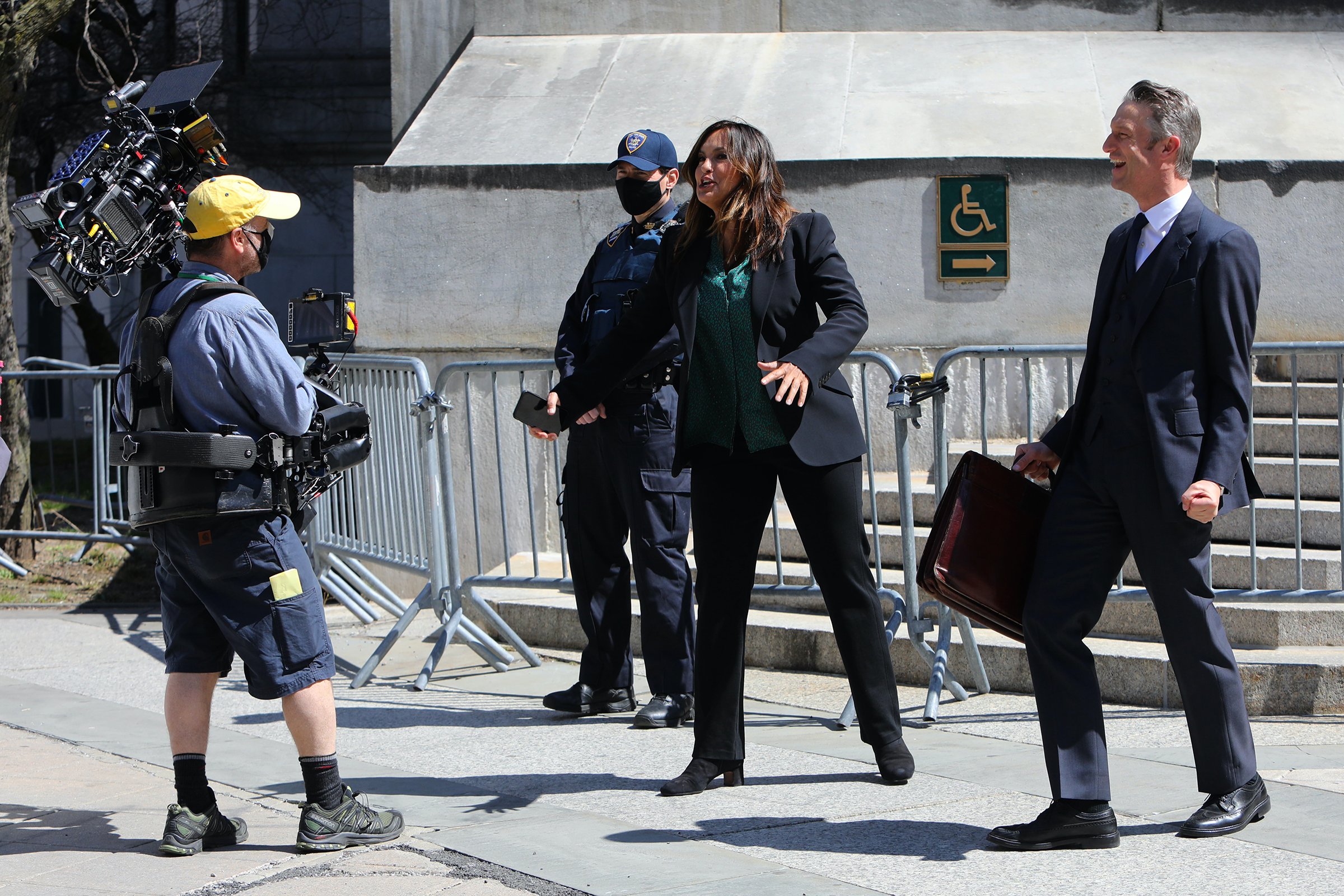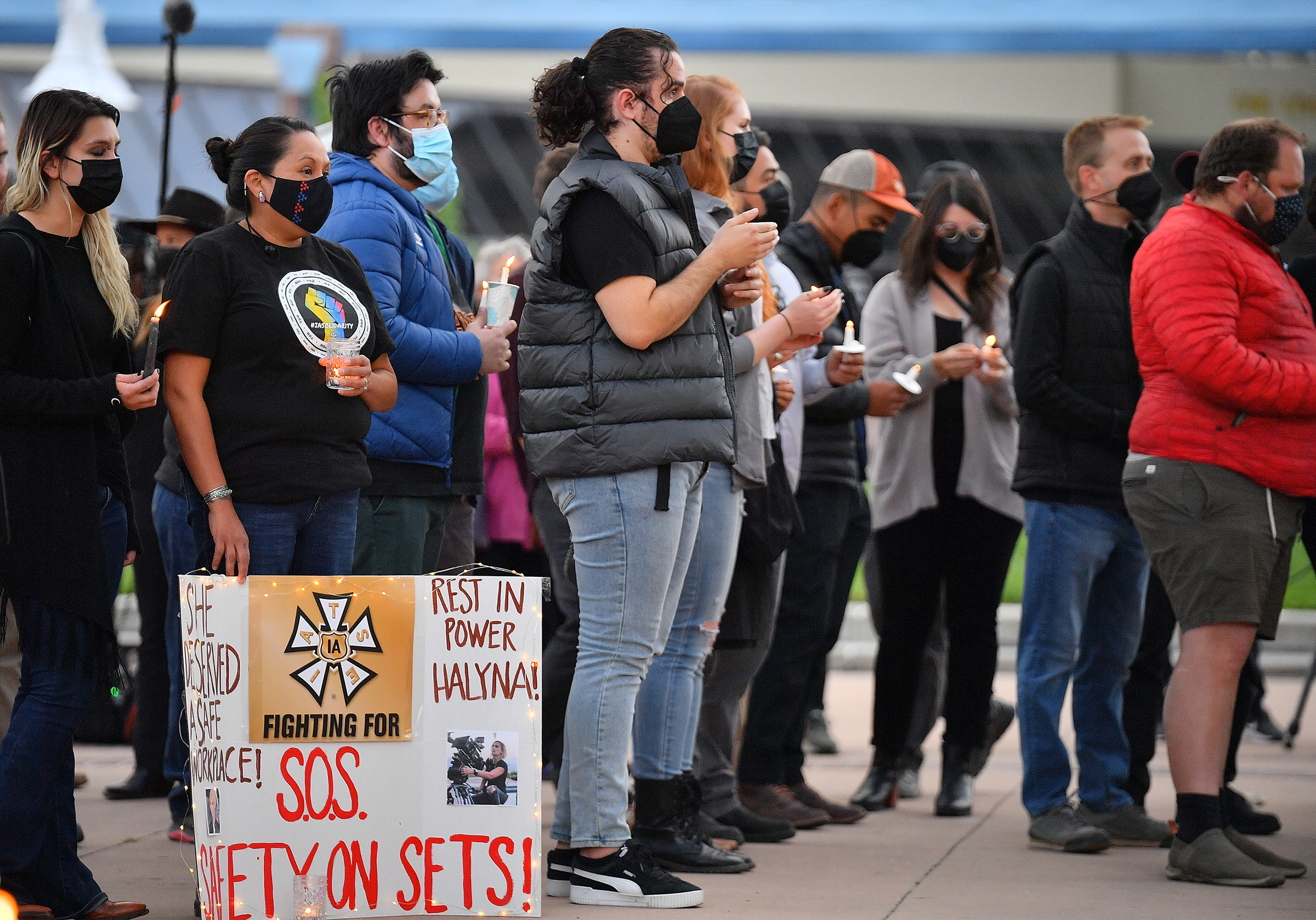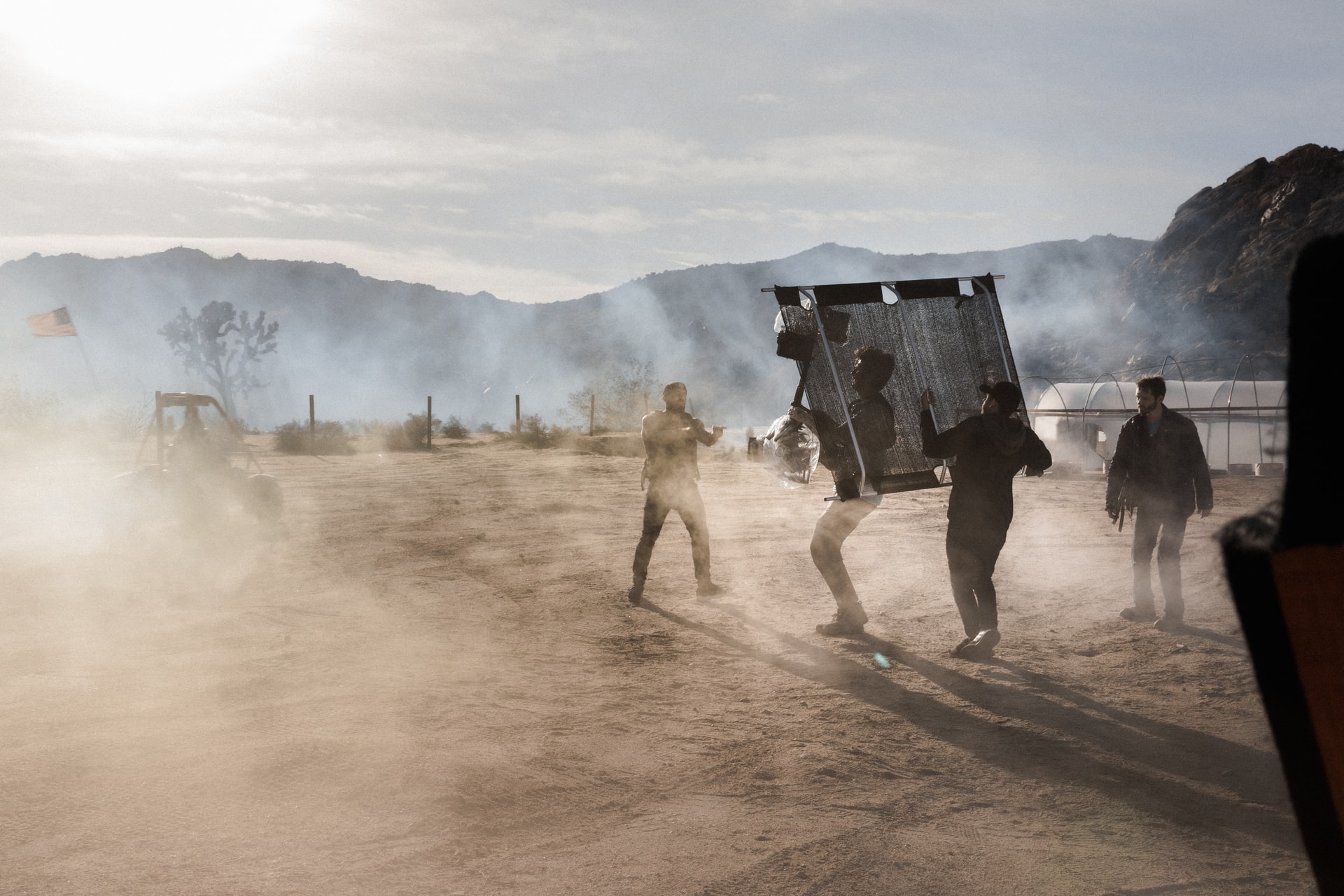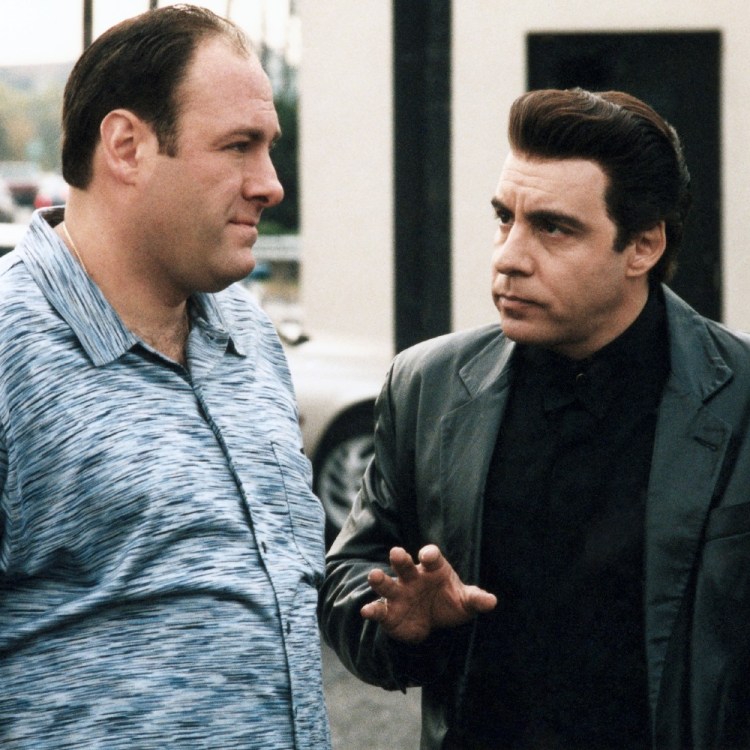“What are you filming?” an excited passerby asks me.
“Game of Thrones,” I reply, standing in front of the SDNY courthouse, four years after Game of Thrones went off the air.
“Can I be in it?!” they reply, apparently oblivious to Law and Order: SVU star Mariska Hargitay, who’s reciting lines with Peter Scanavino 20 feet behind me. Out on the corners of any film set, this type of interaction with New Yorkers is common.
A film crew’s footprint stretches across city blocks, with big rig trucks full of production equipment lining sidewalks that have been reserved by the locations department. Roaming the campus are actors, camera operators, electricians, grips pushing dollies, transpo drivers, prop department workers ferrying carts loaded with chairs that have celebrity cast names printed across the back, make-up artists with translucent backpacks, crafty personnel, parking coordinators, animal wranglers, graveyard shift rigging crews smoking cigarettes as they make their exit, costume designers, set dressers, and somewhere out there, an executive shields their mouth while seething into a cell phone. It is a circus of specificity, with everyone working to make sure what goes in front of the camera’s iris is so perfectly artificial that it looks real when released to the public four months later as a miniseries, show or movie.
The allure of production is a longstanding American myth, with shows like Entourage self-perpetuating the supposed glamor of the business. We can all imagine the director at video village, flanked by writers and producers staring intently at a set of monitors. But little attention is paid to the team of twenty-somethings servicing this cluster of “above-the-line” creatives with coffee deliveries, status updates from basecamp and cheap labor: the Production Assistants.
A Field Guide to Production Assistants
A Production Assistant, PA for shorthand, is an entry-level position in the film and television industry. Television production also has the aura of exclusivity, but the barriers to entry are actually very low: no formal education is required. “You just have to be really industrious,” says Anne Del Castillo, the Commissioner of NYC’s Mayor’s Office of Media and Entertainment. “And punctual.”
PAs tolerate 14+ hour work days, mediocre pay, a lot of responsibility and little to no respect. I’ve worked as a PA for the better part of three years. I’ve filmed in the rain, I’ve filmed in the heat, I’ve filmed in sub-freezing temperatures, I’ve filmed energized and enthusiastic, I’ve filmed hungover and depressed. When I paraphrased this statement to the New York City-based PAs with whom I spoke for this article, nearly all of them said words to the effect of “me too.”
Paid the New York City legal minimum of $15 an hour for the first eight hours and then $22.50 for every hour after that, PAs are dependent on overtime for survival. A full-time NYC PA can expect to bring home about $1,000 a week after taxes — ”full time” here translating to about 70 hours a week. The low pay especially stings when you consider the prosperity of the industry versus the high cost of living in many of the cities where production thrives.
“When I started PAing in 2016, the minimum wage was $10 an hour.” says Liz Grasso, a former Production Assistant, now Assistant Director. “Now that the minimum wage has gone up to $15 an hour, [but] it’s not like inflation stopped or rent stopped.”
“If minimum wage in New York City isn’t raised again for another 10 or 15 years, that means PAs are still going to make $15 an hour for the next 10 or 15 years,” adds Ben Schaeffer, a film and television administrative professional.
And even among the proletarian ranks of the PA, there are tiers that denote tenure, status and responsibilities. Normally it’s a fair, even self-correcting meritocracy. An Additional PA or dayplayer bounces from show to show passing Go and collecting ~$200 for a day’s work. New to the game, the dayplayer is desperate for the opportunity to do something that feels like a contribution to production. The director’s artistic vision sends shockwaves so deep that even the greenest dayplayer can have a hand in the action; even if it’s just nodding to an extra. When I was a young padawan, I cued a background car in the deep frame in an episode of Hightown. My boss said my name on the walkie, and I didn’t mess up. It was awesome.

In New York City, a Staff PA is a production assistant who has been hired to work the entirety of a season of television or a movie. Each staff position has a different role in seeing that the set runs as efficiently as possible, with a single Key PA overseeing the newly hired dayplayers. “A Key PA is basically the chief delegator for production assistants,” Grasso says. “They’re in charge of giving directives as needed by production.” Communicating with Transpo, setting a perimeter of lockups around the camera, and only leaving once the harddrive with the day’s footage has been safely placed in a van on its way to the processing house are among the duties that make the Key PA indispensable to production, though at the expense of their vocal chords and quad muscles.
Meanwhile, in basecamp, the 1st Team PA processes the principal cast through the works. “I’m not doing the hair and makeup. I’m not designing the wardrobe, but I make sure those departments know what’s going on on set, know what’s coming up next and know how much time they have to do their jobs,” says Kylie Esco, an experienced NYC PA. Meredyth Kenney, a SAG actress with appearances in The Sinner, Homeland and more says “PAs are like the jack of all trades … Every time I’m on a set they’re my point person throughout the shoot.”
Far off in the distance, sometimes outside the massive campus, the Background PA makes announcements to a cafeteria full of (occasionally fussy) background actors. Though extras don’t have lines, they still need to be dressed, wardrobe approved, propped, brought to set and positioned in the back of the frame. It’s an anticipation game, and BG PAs need to have a good feel for the cadence on a set. An untimely delivery of extras is a good way to get under the spotlight, and not in a good way. In The BG Manifesto, a living constitution for BG PAs that was passed to me by Grasso, the author(s) write/s, “Much like the rest of civilized society, the background are looking for any excuse to riot and degenerate into one big yelling panicked mob. You cannot let this happen.”
A PA’s most straightforward career path is logging at least 600 set days and then submitting their call sheets and pay stubs to Directors Guild of America for review. “There’s a bigger picture here that we don’t know about when we start that journey as a PA,” says Josh Friedman, author of Getting it Done: The Ultimate Production Assistant Guide. “At the end, we’re qualified to become assistant directors. And if you’ve held all of the staff positions, that’s exactly what a DGA member does.”
Once admitted to the DGA, a PA is eligible to get work as an Assistant Director, which comes with significantly higher wages and the benefits of a union. It’s a long and arduous teeth-cutting journey. “Being in the DGA, being an AD, you’re on that thin line between crew and management,” says industry veteran and DGA member Mathias Luque. PAs that aspire to be ADs approach guildmanship with this in mind.
But it’s not a linear equation; not all PAs eventually become ADs, or even want to be. Luque says being a PA is a great entry point to get into other departments in the industry. If a PA had come to him and expressed interest in joining another department, Luque would do what he could as a Key PA to get them introduced to the right people. At the end of a shoot day, the Key PA assigns dayplayers to log the time at which each department finishes loading their equipment onto trucks. This is called “getting an out time” and is one of the first things new PAs learn on set. “The more subtle way is to put said PA on the truck with the department they’re interested in and hope a conversation starts,” says Luque.
An administrator from The Anonymous Production Assistant, who, naturally, remained anonymous, said in an email, “PAing is still the best way to learn what you really want to do in the business. You get to know everybody, and everybody knows you. You’ll very soon find which department fits your temperament and skills if you’re an open-minded and friendly PA.”
The Perils of Being a Wallflower
The International Alliance of Theatrical and Stage Employees (IATSE) saw more than 98% of voting members authorize a strike when negotiations for a new contract with the Alliance of Motion Picture and Television Producers dried up in October 2021. Demands included more turnaround time, greater compensation for skipped meals and observation of national holidays like Martin Luther King, Jr. Day. The first strike in IATSE’s 128-year history was averted when IATSE President Matt Loeb found common ground with the AMPTP, though many crew members have come out as underwhelmed by the new contract.
The IATSE ratification process functions like the Electoral College, in that the majoritarian choice is not necessarily certain to prevail. According to the IATSE website, “Members vote within their local union and once a local reaches a majority vote, to either ratify or reject, all delegate votes are assigned to the majority result.” In the case of the new Basic Agreement, the popular vote actually favored rejecting the contract, but the delegate vote ratified it.

Of course, the wage increases, guaranteed weekends and all the other wins of the new IATSE contract don’t even trickle down to PAs, as they are not unionized. Schaeffer, who has made attempts of varying seriousness to create a PA union, said organizing the PAs is like “jumping into the pool without any water.” Like union agitators in any industry, PAs risk being labeled as a troublesome hire or resistant to the hard-nosed culture. Schaeffer said he’s been told by ADs that “‘PAs don’t need more money’” so that they’re incentivized to climb the ladder faster. “It’s good that we abuse them, because it weeds out the weak.’”
The Anonymous Production Assistant admin remarked on the borderline competitive nature of sleeplessness in the industry, saying, “I make it a habit to never brag about lack of sleep, because it inevitably leads to one-upsmanship. You shouldn’t talk about the amount you sleep any more than you talk about the amount you’re paid.” Deliberately curated or not, the environment suggests that the only way a PA can possibly be doing their job right is with the unmistakable 100-yard stare of sleep deprivation.
This phenomenon is so familiar that it inspired its own documentary: Haskell Wexler’s Who Needs Sleep, which showcases the perils of overworking film crews. Drowsy driving has long plagued entertainment industry workers, in many cases leading to preventable deaths. In 1997, 2nd Assistant Camera Brent Hershman died in a car accident after he fell asleep at the wheel on the heels of a 19-hour day concluding a 79-hour week. Though a 14-hour maximum workday was established in the new IATSE contract, it is only sporadically applied to the PAs. “There is no hour cap for them officially, unless they’re on certain studio shows,” Grasso says. “NBC, for example, they cap everybody at 14 hours.”
It’s good that we abuse them, because it weeds out the weak.
Meanwhile, on-set injuries are on the rise, with the accidental death of Director of Photography Halyna Hutchins on the set of Rust still front of mind in every corner of the industry. Every major streaming platform is developing its own in-house content and there’s seemingly a set on every street corner in America. The volume of content demanded by consumers, especially after a production stall during COVID, can strain the availability of sufficiently trained crewmembers. Hannah Guiterrez-Reed, the lead armorer on Rust, admitted she felt unprepared to work as a lead armorer on a previous film, and the camera team, all IATSE members, walked off the Rust set after a previous prop-gun misfire and flouted safety requirements snowballed into an intolerable work environment. The fatal accident occurred later that day. Several productions subsequently banned the use of real guns on set.
“In New York City, you’re not allowed to have weapons on set, simulated or otherwise, unless you have a member of the NYPD TV unit,” says Commissioner Del Castillo. Del Castillo inquired within her office about whether changes needed to be made to protocols for scenes involving weapons in the aftermath of the Rust shooting, but concluded “we didn’t have to change anything because we already had those things in place.”
“I think 98% of the time, union sets are safe. Anything that does happen is usually because of the nature of the job, being in a new place every single day, shooting in the city,” an anonymous PA tells InsideHook. But “indies scare the fuck out of me,” they quickly add.
If You Teach a PA to Fish …
“Every day is a different, new experience, whether it’s with different actors or different types of scenes or different types of gear,” says Luque, reflecting on the adventure of show business. “You don’t have to wear a suit, you don’t have to be shaved, you don’t have to hide your tattoos. Everyone is welcome.”
But with the new IATSE contract hitting the ground with an anti-climactic thud and low political support for minimum wage workers, are those positive qualities papering over a fundamentally broken and unjust system? Some PAs are content with the difficulty of their task, or even relish it. “You do need to pay your dues and learn how a real set functions. Working with a hundred strangers for weeks or months on end is a different beast than shooting a short film with your dumbass buddies on the weekend,” says the Anonymous Production Assistant admin.
When I ask Friedman, who wrote the book on PAs, why they keep coming back despite all the detracting factors, he invokes the parable of the shit-scooper and the elephant. While an elephant roams the circus grounds, a grounds-crew member alacritously trails behind him with a shovel and a barrel. A woman walks up to the shoveler and asks him how he can possibly come back to this job, for which he is surely underpaid and subject to terrible conditions. “And he goes ‘What do you mean, quit show business?!’” Friedman says with a muted laugh.
It’s true that four walls and a desk loses its appeal after a week of filming stunts. “The people who stick around … are the people who get this first taste of how interesting and fulfilling working in film can be. And they can’t go without it,” Grasso says. “It’s a giant dopamine hit.”
But dopamine in excess can be toxic.
“I literally had to stop myself, reevaluate and ask, ‘How can I make this better?’” Friedman says, reflecting on his time as an Assistant Director. “And it starts with education, knowing what a PA is and knowing what a PA does.”
Friedman is now the CEO of CrewMeUp, an app for connecting industry creatives with more than 3,000 users. The site has links to literature and magazines for new PAs, so no one hits the field without taking at least some imaginary film set reps. “PAs are temporary,” Friedman concludes. But “today’s PA is tomorrow’s director.”
New York City has taken a bureaucratic approach to the evolving landscape of PA-dom, organizing a five-week training program that prepares industry newbies for set life. “We’ve had participants who were unemployed, graduating the program and making a really decent living that changes the economic status of their entire family,” Commissioner Del Castillo says. “Many of the participants that we’ve had in the 15-year history of the PA program have moved on to higher level jobs that are union.”
The program, now in its 66th cycle of trainees, is back to its pre-pandemic level of competitiveness, accepting just 10% of the 800 to 1,000 applicants who enlist each year. A class of predominantly female candidates is set to graduate this week, and the next cohort — bright-eyed, bushy-tailed — starts in April.
This article appeared in an InsideHook newsletter. Sign up for free to get more on travel, wellness, style, drinking, and culture.
























